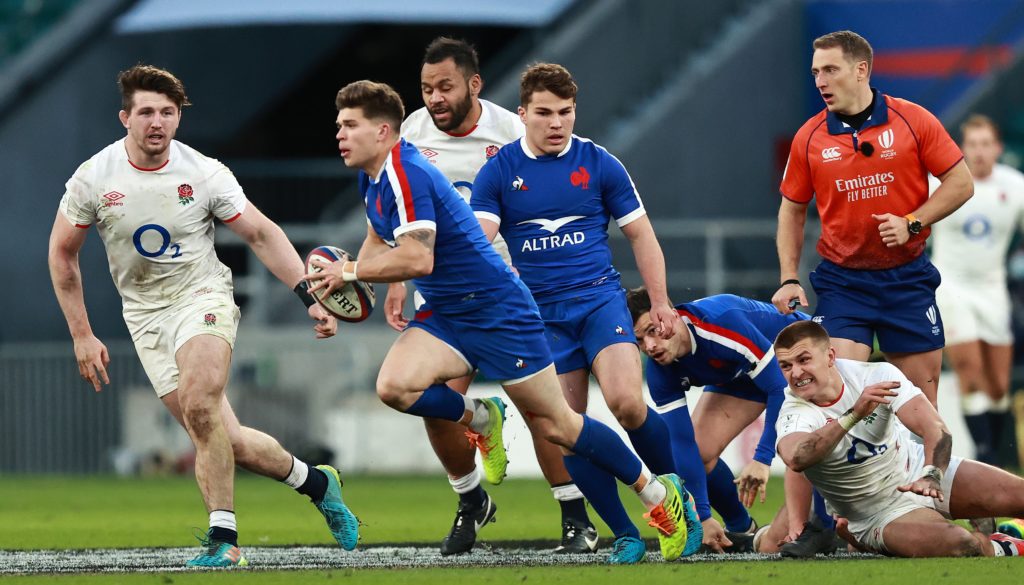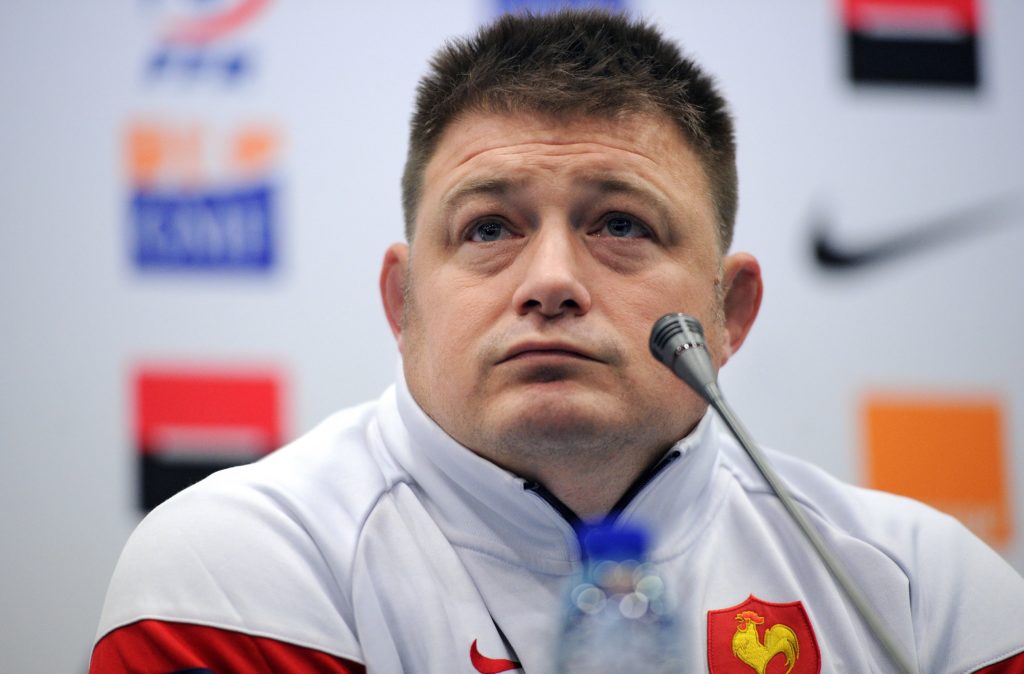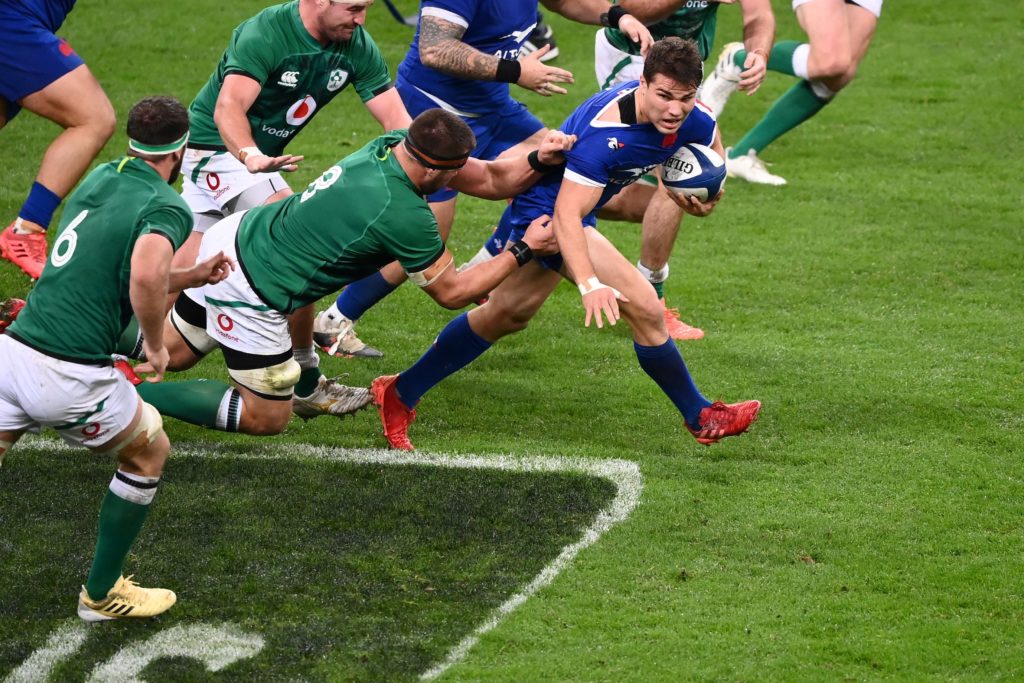In a decade of despair, surely the 2015-2016 season was when France as a rugby nation hit rock-bottom. It began with their quarter-final humiliation in the 2015 World Cup, a 62-13 thrashing at the hands of New Zealand, encompassed a wretched 2016 Six Nations, when they would have finished bottom of the table had they not scraped past Italy 23-21 in Paris, and ended with their Under-20s edging out Georgia 27-24 in the World Championship’s ninth-place play-off. The future looked grim.
Yet, two years later, France won their first Under-20 title, a feat they repeated the following year, and since 2019, Les Bleus have been gradually rediscovering their va-va-voom. As Eddie Jones said after Saturday’s nail-biter at Twickenham: “We’re going to be racing them to the World Cup… they are a good team, they’re developing, we’re developing, and it’s going to be a good race between the two of us.”
A mark of how the French mindset has changed in the past couple of years was in the players’ reaction to the 23-20 defeat against England: anger with themselves for failing to close out the game in the final few minutes. In years gone by, they would have patted themselves on the back for running the English so close.

Much has been said and written (and rightly so) about the scintillating generation of young talent that France have – Dupont, Alldritt, Jalibert, Woki, Marchand, etc – but these players are prospering because of the change in the production line.
Few rugby people outside of France have heard of Didier Retière but arguably this is the man who is more responsible than anyone for reviving the fortunes of French rugby.
The 52-year-old was an average prop in his day who turned to coaching at the start of the Millennium. He cut his teeth with the France U19s, moved to the U21s and was then recruited by Marc Lièvremont as his forwards coach when he became coach of the national side in 2007. He returned to the U20 set-up after Lièvremont left his post in 2011, and then in 2014 came the big one: Retière was appointed the National Technical Director of the FFR.
That chaotic World Cup campaign papered over the cracks in French rugby. The cracks grew larger and eventually the whole structure caved in during that calamitous 2015-16 season.
Retière’s finest hour as a coach had been in 2011 when France recovered from losing to Tonga in the pool stages to reach the final, where a nervous New Zealand just managed to see off their opponents. Yet what that chaotic World Cup campaign did was paper over the cracks in French rugby. The cracks grew larger in the following years and eventually the whole structure caved in during that calamitous 2015-16 season.
From the wreckage of the 2015 campaign a working party was formed by the FFR to examine what had gone wrong with the game in France: why had they become so inferior technically, mentally and physically to the rest of the Tier One sides? Retière was among the 12 members and they reported back in April 2016 with 15 proposals, among which was the formation of an elite squad of 30 players, agreed rest period for international players in the off-season and an incremental increase in the number of French-qualified players (what are known as JIFFs) in the Top 14 matchday squads of 23: from 14 to 16 and, pending ratification, to 17 as of the 2021-22 season.
The most significant proposition, however, concerned the development of youth players and led to a root-and-branch reform of how France managed their ‘espoirs’, the 15-to-18 age group.
In the late 1990s France launched a series of regional centres of excellent across the country to detect and develop promising young players; a challenge that is more acute in France compared to their Anglophone rivals because of the absence of competitive sport in schools. These centres worked with schools in helping talented players manage their academic work with individual training programmes devised by the FFR. The problem, as the working party discovered, was that these young players had no contact with clubs so when they left school they often struggled to adapt to the demands of a different system.

Consequently, as a result of the FFR report in 2016, these centres were phased out and replaced with 25 academies, from Haubourdin in the far north of France to Bayonne and Toulon in the south. There is also one in Nouméa, New Caledonia, which has been a rich source in recent years for French age-group teams.”A lot of very good work has been done by the youth centres… but since 1998 rugby has evolved,” said Retière in 2018. “You would frequently hear, ‘It’s working really well within the FFR set-up but we don’t know what’s going on in the clubs’. And vice-versa. Everybody, the clubs and the FFR, had the impression the system was working well – except the players. They were caught in the middle, permanently stuck between two structures.”
An academy manager was appointed whose raison d’etre was, in Retière’s words, “to create a synergy between the club and the Federation” and the instructions issued to the coaches in each of the academies was to develop a distinctive ‘French style of rugby’ in each player. Coaches from the Top 14 clubs drop in to take coaching sessions, and players in decision-making positions are sent to the national training centre at Marcoussis to work on their “leadership and their attitudes”.
We’re starting to have a winning culture with the young French players, we’re moving in the right direction… we’re capable of moving mountains.”
Didier Retière
Asked to elaborate by L’Equipe in 2018, Retière explained that the long-term goal was to “teach the players the skills required to reach the top level, the physical and technical skills, and also game understanding. It’s a game based on seizing the initiative and adapting to one’s opponents”. The project was already underway before the official launch of the academies in January 2019, and the first to benefit was the U18 side who won the European Championship in 2016 and 2017, among whom were Romain Ntamack and Louis Carbonel. To illustrate how the mindset of the next generation was already changing, Retière pointed to the U20 side who had just beaten England to win the 2018 World Championship. “You never saw the captain or the kicker asking his coach what they should do,” he said.
France retained the U20 title in 2019, and they did it by fighting back to beat Australia 24-23 in the final. “We’re starting to have a winning culture with the young French players, we’re moving in the right direction” said Retière. “We must be competitive in the long term, supply players to the French team… these back-to-back titles show we’re capable of moving mountains.”

The success of the U20s was an encouraging way to close what was probably the most dispiriting decade in France’s rugby history. It had started so promisingly with a Grand Slam and a World Cup final appearance but as the decade wore on it became apparent that France were being left behind by their rivals; it felt at times like they were still operating like amateurs. Nor did it help that the period 2010 to 2015 was when the Top 14 was running riot financially, buying up the big names from around the world and bringing them to France; when Clermont played Toulon in the final of the 2013 Heineken Cup, for example, only 11 of the 30 players that started the game were French. It was wonderful to watch but woeful for the French game, eroding its culture and its confidence.
“We’ve often talked about the development systems in other countries but these two titles show we’re doing all right,” said Retière in 2019. “We are working towards 2023.”
The player is at the centre of the system and the national teams are there to help him develop. We want to make them understand that the player is the author of his performance.
Didier Retière
The evidence to support Retière’s claim was there to see in the final of the Autumn Nations Cup last December when a third-string French team – boasting 68 caps – took an England side containing 889 caps to extra-time. “For too long with the young players, there has been a culture of the team before everything and above all a short-term vision,” said Retière after that Autumn Nations defeat.
“We’ve changed our philosophy. The player is at the centre of the system and the national teams are there to help him develop. We want to make them understand that the player is the author of his performance. I liked the reaction of our players like Cameron Woki after the defeat by England. They weren’t lambs to the slaughter, they went to win… they have the ambition but they know the work they must do to reach the very highest level.”
France have reached three World Cup finals without getting their hands on the big prize. The feeling is growing in France it will be fourth time lucky in 2023, although it won’t be luck if they win the Webb Ellis Trophy but the result of restructuring overseen by Retière.
More stories by Gavin Mortimer
If you’ve enjoyed this article, please share it with friends or on social media. We rely solely on new subscribers to fund high-quality journalism and appreciate you sharing this so we can continue to grow, produce more quality content and support our writers.


Comments
Join free and tell us what you really think!
Sign up for free